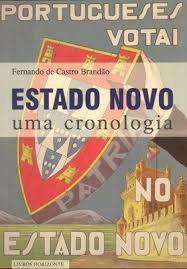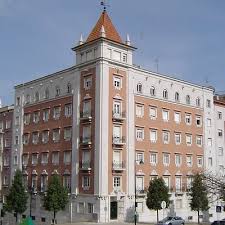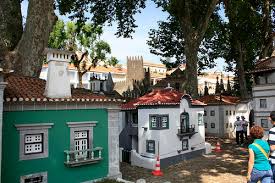
Remonstrated an elderly friend in
Lisbon, “These days, it is fashionable to decry everything from the time of the
Estado Novo as bad! This is simply
not true!” Without pronouncing on whether the
Estado Novo was a paragon of
virtue and has an undeservedly bad reputation, one could agree that there are
things one could appreciate from the
Estado
Novo.

In matters of the built form for
example, there is much that one has to appreciate (if one can separate the form
from the authoritarian socio-political context that gave birth to it). The
constructions of the
Estado Novo are
often examples to behold. Solid, monumentalist structures, these buildings were
very much influenced by the European fashions of the times, whether it was the
Iberian styles favoured in Franco’s Spain, or the tough, no-nonsense, forms of
Stalinist architecture And yet, not everything that the
Estado Novo produced was (or is) worthy of delirious acclaim. Take
Portugal dos Pequenitos for example.
 Portugal dos Pequenitos
Portugal dos Pequenitos, or Portugal of the little ones, is an
architectural theme park in the historic city of Coimbra. Set up in 1940, the
park is a mélange of scaled miniature replicas of a variety of monuments and
buildings that constituted Portugal in 1940. Thus, one has representations of; the
famous monuments within continental Portugal, homes from different regions in
continental Portugal, as well as monuments, or other built forms from what were
then Portuguese territories spread across the world. The objective seems to have
been to stamp in the minds of the young, and those of infantile imaginations,
the grand diversity that was Portugal, underlining the refrain of the time
“Portugal não é um país pequeno”
(Portugal is not a small country).
 Rather than
constitute buildings in their entirety however, the theme park focuses on
particularly noteworthy features of buildings, and incorporates them into
single constructions. The result can be quite overwhelming, like eating too
much of a rich dessert (Portuguese desserts are particularly heavy, but this is
another matter), forcing one, after a point, to effect a quick escape from the
place. But then, given that the visiting children, the park’s intended audience,
don’t seem to suffer from such affected sensibilities, perhaps if some want to
effect quick escapes, they are welcome to?
Rather than
constitute buildings in their entirety however, the theme park focuses on
particularly noteworthy features of buildings, and incorporates them into
single constructions. The result can be quite overwhelming, like eating too
much of a rich dessert (Portuguese desserts are particularly heavy, but this is
another matter), forcing one, after a point, to effect a quick escape from the
place. But then, given that the visiting children, the park’s intended audience,
don’t seem to suffer from such affected sensibilities, perhaps if some want to
effect quick escapes, they are welcome to?
 If there is one
particularly embarrassing portion of the park, then it has to be the entrance
to the park, that is constituted, or was at the time of my visit some years
ago, of towering statutes of muscular ‘African’ men depicted from the waist up,
arms crossed over their chests. In a politically correct age, when we do not
engaged in racialised depictions of persons, where the ‘African’ as the
‘savage’ with thick red lips is definitely not a polite representation, this
reception to the park is quite horrific. Perhaps, however, the answer to this
debacle is not to get rid of them, but to place those statues in the context of
its time, highlighting the racialised understandings of the Estado Novo).
If there is one
particularly embarrassing portion of the park, then it has to be the entrance
to the park, that is constituted, or was at the time of my visit some years
ago, of towering statutes of muscular ‘African’ men depicted from the waist up,
arms crossed over their chests. In a politically correct age, when we do not
engaged in racialised depictions of persons, where the ‘African’ as the
‘savage’ with thick red lips is definitely not a polite representation, this
reception to the park is quite horrific. Perhaps, however, the answer to this
debacle is not to get rid of them, but to place those statues in the context of
its time, highlighting the racialised understandings of the Estado Novo).

In racial terms,
what should please the activists of Goa
Indica, is that when one excitedly runs over to the representative models
from (Portuguese) India, it is not the Arch of the Viceroys that stands out,
but the representation of Goan temple towers, and a building that looks like a
blend between temple and mosque. It seems that, contrary to popular opinion,
the Estado Novo, was also at pains to recognize the presence of non-Christians
in its most symbolic overseas possession. So much for the Estado Novo.
(A version of this post first appeared in the O Herald dated 18 March 2012)

2 comments:
You have to be a child to really apreciate Portugal dos Pequeninos, Jason.It's not that different from reading Edgar Rice Burroughs, Salgari, Verne, etc. Products of their time, but products made by people that knew what people enjoy, specially young people. Hopefuly all of us grow up and move past that age, but it's good to have those memories.
Nice to come across small tit bits about Portugal. Our interest is historical, but not much is available, day to day, except on a visit to Goa.
Thanks.
Post a Comment